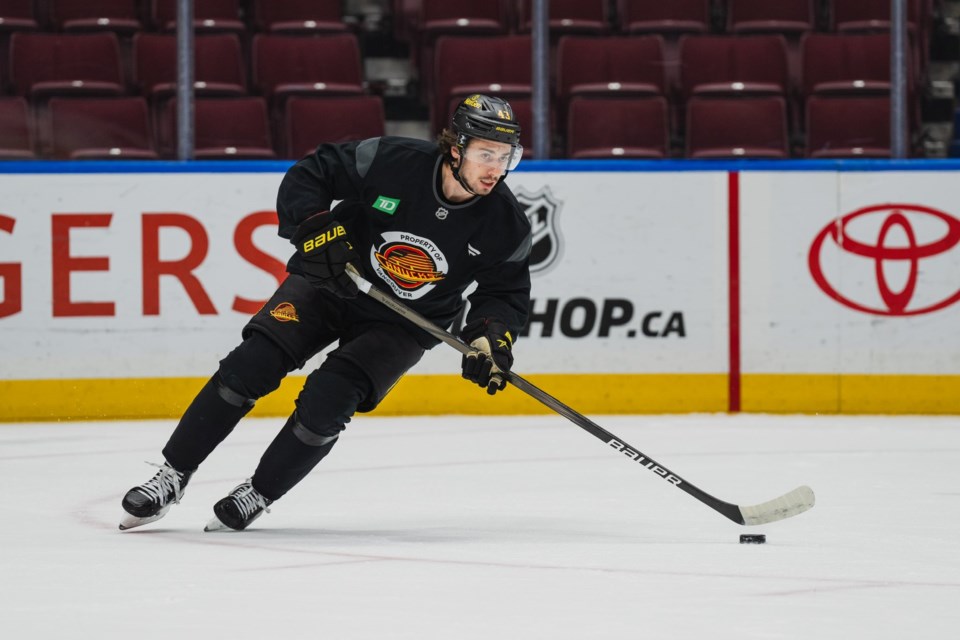The Vancouver Canucks are in trouble.
The Canucks' 2024-25 season was on shaky enough ground with their Norris-winning and Hart-deserving captain, Quinn Hughes. They've technically lost more games than they've won, even if they've taken eight of their losses to overtime. Their 17-10-8 record that has them just barely in a Wild Card spot in the Western Conference.
Now they'll be without Hughes for an indeterminate amount of time, as well as franchise forward Elias Pettersson for a slightly more determinate amount of time.
"They're not gonna make the trip," said head coach Rick Tocchet after Sunday's practice. "Petey is probably a week away, give or take a day here or there, and Quinn's probably week-to-week."
That's bad news for the Canucks, who are already missing Filip Hronek, who is expected to be out until the end of January while recovering from a reported upper-body injury, suspected to be a shoulder separation. That leaves the Canucks without their entire top pairing on a blue line that was already questionable behind them.
"He's just a tough kid"
That raises the question of whether Hughes should have played in the Canucks' December 23 game against the San Jose Sharks. Hughes was already hurting, with rumours suggesting a hand injury, and was considered a game-time decision. He not only played, but also led the Canucks in ice time.
"He couldn't have hurt what he has any more," said Tocchet. "He's just a tough kid and he won us the game with a couple of assists. I don't think him playing — I don't know, I don't think it would have made a difference."
That raises another question: what's the difference between now and then? If Hughes could push through the pain to play against the Sharks and Tocchet says he can't hurt it any more, why can't he push through it now? Did the injury get worse in the last week despite Tocchet saying playing the game wouldn't make a difference? Did they find out more about what the injury was and shut him down because it was worse than they originally thought?
As much as you want to give the Canucks and their medical staff the benefit of the doubt, they don't have the best track record, which leads to these types of questions.
There's a long history of lionizing hockey players (and other athletes) for pushing through pain to accomplish something great in big moments. It's just questionable whether game 34 of an 82-game regular season against the last-place Sharks counts as one of those big moments. Was it really worth the risk — any risk — to win that game?
For that matter, if the Canucks supposedly couldn't beat the lowly Sharks without Hughes, what does that say for their chances while he's out week-to-week?
The Canucks fell apart without Hughes and Pettersson on Saturday
The Canucks' first game without Hughes and Pettersson went well for 55 minutes, as the Canucks took a 4-1 lead in the third period and seemed to be in complete control. Then it all fell apart, as the Canucks gave up three goals in the final five minutes of regulation and lost in overtime to the Seattle Kraken.
It was one of the worst collapses in NHL history — literally, as it was only the third time a team had come back from being three goals down in the final five minutes of a regular season game.
You have to think that result would have been different with Hughes and Pettersson, not only for what they contribute on the ice, but also their calming presence on the bench. They're two of the most unflappable players on the team.
But while Hughes' leadership will certainly be missed, what he brings on the ice will be the most obvious absence. He's the most reliable breakout artist in the NHL and often the only defenceman on the Canucks who can be counted on to transition the puck up ice with possession.
Hughes leads the Canucks in corsi (58.4%), shot differential (+86), and goal differential (+18) at 5-on-5. With Hughes on the ice at 5-on-5, the Canucks have out-attempted their opponents 740-to-528, out-shot their opponents, 358-to-272, and out-scored their opponents 39-to-21. That's not to mention what he contributes on the power play.
In other words, when Hughes is on the ice, the Canucks are an elite, dominant team. Without Hughes, it's a different story.
When Hughes isn't on the ice at 5-on-5, the Canucks have a 42.5% corsi, a minus-114 shot differential, and a minus-10 goal differential. The Canucks' corsi and shots-for percentage without Hughes would rank dead last in the NHL; their goals-for percentage would rank 28th.
The difference between the Canucks with and without Hughes is the difference between being a top-five team in the NHL and being arguably the worst team in the NHL.
So, yes, the Canucks are in trouble. They could be hanging on for dear life for the next few weeks until Hughes returns or praying for a medical miracle that brings him back into the lineup at full health in a much briefer span of time.
Either that or the Canucks are going to be forced to make a trade for a defenceman sooner than they might have liked.
No one can replace Hughes but it's troubling just how bleak the Canucks' blue line looks without him and Hronek. The Canucks already needed at least one more top-four defenceman before Hughes got hurt; his injury just exacerbates that need.



